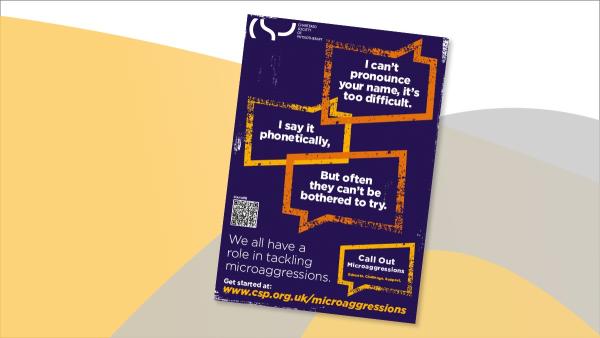The launch of the EDB strategy at the end of 2021 work progressed throughout 2022 to offer support for members

Following the approval by council of the new strategy in the last quarter of 2021, throughout 2022 the CSP made comprehensive progress to enhance support and belonging among members from minoritised communities, piloting a new approach to providing additional practical support in the workplace and in raising awareness of microaggressions with a major membership communications campaign.
Building autonomy for diversity networks
Following a review of the functioning of all CSP networks – and with the agreement of CSP Council in December 2021 – a new model constitution was introduced for diversity networks in 2022, enabling them to access similar resources to other CSP networks (such as regional networks) for the first time.
Additionally, this change in governance arrangements created more leadership opportunities – the posts of chair, vice-chair and up to ten committee members for each network – enabling more diversity network members to gain valuable experience they could apply in their professional life, too.
CSP support to broaden engagement
The aim of these changes was to enable diversity networks to better engage and support existing members, grow their memberships and engage the broader CSP membership with equity, diversity and belonging.
Alongside constitutional changes enabling diversity networks to hold events, the CSP recruited for a permanent diversity engagement officer. The post provided additional support to networks to open events to other CSP members, staff and other AHPs for the first time. By the end of 2022, membership of the BAME network had increased by 16 per cent; the DisAbility network by 17 per cent and the LGBTQIA+ network by 12 per cent year-on-year.
The diversity engagement officer also facilitated the first in-person diversity network day since the onset of the Covid-19 pandemic, and the largest to date. The day was highly valued by those that attended, fostering closer understanding and solidarity across the diversity networks.
Introducing equality reps in the workplace
As part of the CSP’s commitment to ensuring our members feel supported and represented in the workplace, in 2022 the CSP initiated a pilot of workplace equality reps, with the aim of demonstrating allyship and challenging discrimination.
The initial pilot took place across trusts and health boards in England and Scotland, with nine reps in the first cohort, in workplaces where there was already a CSP steward present. In their new roles, the reps advised on equity, diversity and belonging policy within their trust or health board, delivered training and advised stewards on relevant case work.
With positive feedback from the initial pilot, and to provide more data on the utility of workplace quality reps for members, the CSP decided to expand the pilot from January 2023.
Raising awareness of microaggressions

Guided by the new strategy, CSP members and staff worked together to build a member communications campaign with the objective of demonstrating and building allyship across the membership. Further collaboration developed this work into a distinct campaign around microaggressions, with a multi-channel campaign launching in November 2022.
The campaign aimed to enable members with different needs, identities, and backgrounds to feel like they belong; to ensure physiotherapy is seen as inclusive; increase awareness among managers about the importance of creating a supportive environment; and reduce microaggressions faced by physiotherapy staff and students with marginalised protected characteristics.
The campaign comprised an online hub, including downloadable posters, member case studies, an explainer animation, and a practical guide to reporting behaviours. Printed posters were sent to 60,000 members in Frontline and there was a social media campaign to highlight this type of discrimination.
There were more than 10,000 unique page views (UPVs) of the online hub within the first eight months, approximately 16 per cent of our membership.
Support on social media was strong, with organisations including Council of Deans Health, Allied Health Professions NI, University Salford Physio and East Cheshire NHS AHPs all sharing material.
Campaign evaluation showed that there was a 13 per cent increase in members’ awareness of the term ‘microaggression’ and a 10 per cent increase in members saying they would report a microaggression.
Find Out More
Number of subscribers: 1
